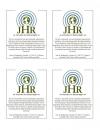Friday, June 13, 2008
Article #3 from Volume 1, Issue 3: Your Media, Your Human Right
“Community Radio: Pluralism in Media”
Jacob Galfano
“Let’s be clear,” says Jacqui Brown Miller, board member and president of the South Puget Sound Chapter of the Alliance for Democracy. “Radio, television, newspapers… media is supposed to be the fourth estate of democracy. It should inform the citizenry, so they can participate and challenge the system. But it is not doing that job, not engaging the people.”
Although Miller participates in media in a very specialized way, her sincerity and desire to create change are manifest in both word and action and illustrate that policy is not shaped just by the rich and powerful.
She leads a coalition of activists who are applying for a non-commercial educational (NCE) full-power radio broadcast license.
In 2006, the Federal Communications Commission (FCC) announced that it would open a window during which community organizations could be considered for space on the spectrum.
That time is now.
 Community radio encompasses an increasingly integrated movement consisting of both low-power (LPFM) and full-power stations and non-governmental organizations (NGO) at local, state, and national levels that deliberate and mobilize around media policy and legislation.
Community radio encompasses an increasingly integrated movement consisting of both low-power (LPFM) and full-power stations and non-governmental organizations (NGO) at local, state, and national levels that deliberate and mobilize around media policy and legislation.
Jacob Galfano
“Let’s be clear,” says Jacqui Brown Miller, board member and president of the South Puget Sound Chapter of the Alliance for Democracy. “Radio, television, newspapers… media is supposed to be the fourth estate of democracy. It should inform the citizenry, so they can participate and challenge the system. But it is not doing that job, not engaging the people.”
Although Miller participates in media in a very specialized way, her sincerity and desire to create change are manifest in both word and action and illustrate that policy is not shaped just by the rich and powerful.
She leads a coalition of activists who are applying for a non-commercial educational (NCE) full-power radio broadcast license.
In 2006, the Federal Communications Commission (FCC) announced that it would open a window during which community organizations could be considered for space on the spectrum.
That time is now.
 Community radio encompasses an increasingly integrated movement consisting of both low-power (LPFM) and full-power stations and non-governmental organizations (NGO) at local, state, and national levels that deliberate and mobilize around media policy and legislation.
Community radio encompasses an increasingly integrated movement consisting of both low-power (LPFM) and full-power stations and non-governmental organizations (NGO) at local, state, and national levels that deliberate and mobilize around media policy and legislation.Its scale is far-reaching, as ‘membership’ might include FCC commissioners, national and state elected officials, non-profit employees, and on down to the volunteer who answers the phone during your local station’s pledge drive.
This participatory phenomenon is known as pluralism, which provides an alternative to elite theory. According to scholars Theodoulou and Kofinis, pluralism “assumes that a democratic governing system can operate even in light of an unquestionable inequality of resources between classes. [It] suggests that politics and policy are the consequence of the interaction and conflict among groups… [and] that all individuals posses the opportunity and ability to organize and collectively influence the political a policy process.”
Miller and Alliance for Democracy are hoping to receive a frequency to be allocated by the FCC after the current window closes.
She hopes the station can provide service to audiences marginalized by corporate radio and has been careful to include these voices in the application process.
“We want worthwhile and diverse outreach, and have sought out Native American, Latino, environmental, and labor representation [among others].”
This is an important element of pluralism, especially when it comes at a time when minorities are underrepresented within and across mainstream media. According to the American Society of Newspaper Editors, minorities comprise just 11% of professional journalists. This inequity is compounded when considering that minorities own just 8% of full-power radio stations, according to the StopBigMedia.Com Coalition. Miller realizes being awarded the license will not be easy.
It is a long, arduous process, and her group must anticipate and prepare for several logistical requirements. According to Prometheus Radio – a national community radio NGO – NCE license applicants must be aware: “Unlike with low power FM, you must submit an engineering exhibit proving that your proposed station will cause no interference to existing radio stations.”
As the radio industry moves toward incorporating digital signals into bandwidth, the capacity for interference with other signals emerges as a problem. Jonathan Lawson, Executive Director of Seattle’s Reclaim the Media and co-organizer of the Northwest Community Radio Network elaborates: “The FCC has decided that U.S. digital radio will use a new system which makes a station’s signal ‘wider’ within its designated channel.
This has [a] negative effect from the point of view of people who believe that analog FM radio is likely to remain an important resource for grassroots media in the U.S. because wider transmissions are more likely to bleed into adjacent channels that would otherwise be available for other stations, especially including LPFMs.”
Whether or not Miller and Alliance for Democracy are awarded a frequency, their actions demonstrate that – as posited by scholars MacRae and Wilde – “informed citizens can be their own policy analysts.”
Posted by
UWJHR
at
9:51 AM
|
Labels: human rights, jacob galfano, media, newsletter, pluralism, university of washington, uwjhr
Labels: human rights, jacob galfano, media, newsletter, pluralism, university of washington, uwjhr
0 comments:
Post a Comment







